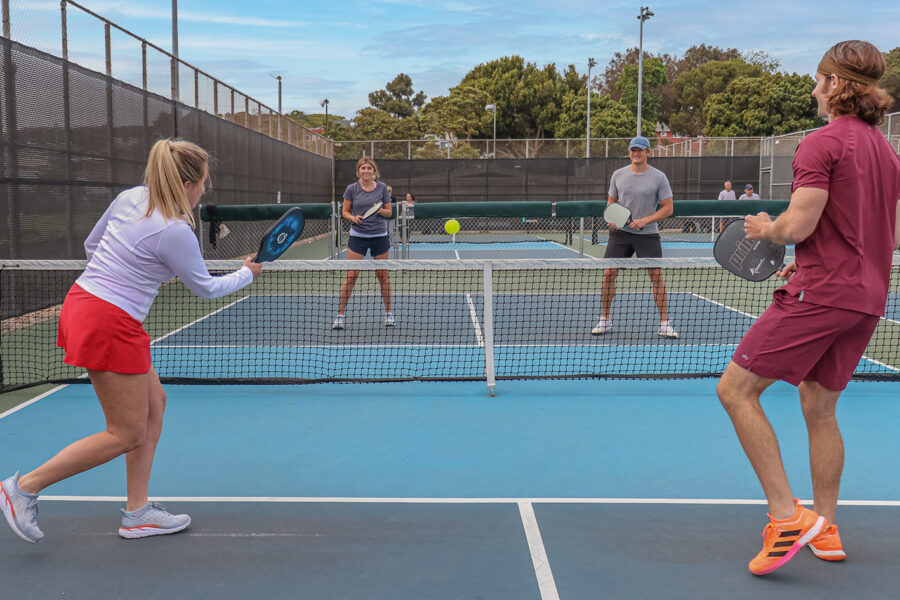
The Fastest Growing Sport in the Country!
A sport created by three dads who were trying to entertain bored kids while vacationing in the summer of 1965 has blossomed into the fastest-growing sport in the United States. In fact, pickleball is not just growing, it’s exploding. According to the Association of Pickleball Professionals at the end of 2022, more than 36.5 million Americans have played the game.
It’s become big fun for players of all ages and big business for entrepreneurs.
Yes, this simple game played on a hard court that’s both narrower and shorter than a standard tennis court (less than one-third the size) combines elements of tennis, badminton and ping pong and is booming nationwide. Here in the Philadelphia metropolitan area, the game has burst into a super popular way for people to stay active, lose weight, increase social interactions and maybe even do some networking.
The game can be played indoors or outdoors and the Philly region is home to what’s been promoted as the largest indoor pickleball tournament in the Mid-Atlantic – The Atlantic City Pickleball Open. The event debuted last September with 775 players and is set for its second annual run this year, Sept. 19-23, at the Atlantic City Convention Center. As many as 1,500 players are expected this year.
“When I started playing this game back in 2016, I had so much fun,” said Randy Sussman, one of the three owners/organizers of the Atlantic City Pickleball Open. “I said this is a sport for every age. It’s the only sport where a grandfather can play with his granddaughter and be very competitive. This sport is here to stay.”
But there’s more proof of the growth in the region and the nation.
In March, what has been described as the region’s first fully dedicated indoor pickleball facility – Proshot Pickleball – opened in Egg Harbor Township, NJ. In May, Bounce Pickleball opened at the site of the former Great Valley Racquet Club in Malvern, PA, with 16 courts, a teaching pro, instructors and lessons available. Bounce plans on opening six facilities in the region in the next couple of years. This summer, Pickle Juice, another indoor pickleball facility that combines high-end courts, a juice bar and a pro shop, opened its first location in Ventnor, NJ. Its second is set to open in 2024 in the Blackwood section of Gloucester Township, NJ. All totaled, Pickle Juice plans to open as many as 15 locations in the next five years.
On Sunday, April 2, nearly 800,000 viewers tuned in to watch Pickleball Slam, an exhibition doubles pickleball match featuring four tennis legends – John McEnroe and Michael Chang competed against Andre Agassi and Andy Roddick on ESPN with $1 million going to the winning team (Agassi and Roddick). The event, held at the Seminole Hard Rock Hotel & Casino in Hollywood, FL, was considered a huge win for the sport and its future as a potential TV property. CBS Sports Network has a contract with the Professional Pickleball Association Tour to air 30 hours of coverage this year.
“The Pickleball Slam was awesome,” said Brandon Mackie, a former tennis player who is one of the three founders of the website, pickleheads.com, which helps pickleball players find locations to play, nationwide. “That day was one of our highest days of traffic ever on the website. The event definitely created a lot of buzz and interest in the sport.”
Philadelphia Eagles center Jason Kelce and left tackle Jordan Mailata play the game as do Kelce’s tight end brother Travis and his Kansas City Chiefs quarterback Patrick Mahomes, as the Kelce brothers discussed on their podcast, New Heights.
The Sports and Fitness Industry Association reports that pickleball’s average growth rate over the last three years is 158.6 percent. Pickleball USA, the sport’s national governing body says that Pennsylvania ranks ninth in total places to play in the country and New Jersey is 20th.
You can even celebrate National Pickleball Day on August 8 every year, marking the anniversary of the game’s invention. And there’s even a push to make pickleball an Olympic sport as early as 2028 when the Summer Games return to the United States in Los Angeles.
Pickleball is everywhere, for everyone
According to Mackie’s website – which includes one of the largest databases of pickleball courts in the country – from the northern reaches of Bucks County, PA, to the southern parts of the Jersey shore, there are more than 125 public facilities to play. At many of these spots, dozens of folks appear for open play sessions usually coordinated via various smartphone apps such as Meetup. On pickleheads.com, you can find a place to play near you by simply typing your town, state or facility’s name and clicking search. Mackie says some of the busiest places to play in the region are Venella Memorial Park in Runnemede, NJ, the Garden State Rotary Complex in Cherry Hill, NJ, and Paddock Park in Haverford Township, PA.
And yes, adults are out there playing on evenings, on weekends, in organized leagues or in open play. But kids are also getting in on the act, not only out in the community but also many teens are getting introduced to the sport by playing the game in gym class. Overall, pickleball is truly a game for anyone.
“The 18-34-year-old age group is the largest percentage of pickleball players and more specifically, within that, the 18-24 segment, that youngest segment, is the fastest growing segment,” says Mackie, a 34-year-old entrepreneur based in Arizona. “The sport has really gone from something for the senior community to showing up in high school “phys ed” classes and college campuses.”
“All you need are a pair of sneakers and a paddle,” says Sussman, who after starting to play the game seven years ago, started a pickleball-exclusive apparel company, PB1965 – the name an homage to the founding fathers of pickleball (Joel Pritchard, Barney McCallum and Bill Bell) who created the game at Bainbridge Island, Washington in 1965.
Both Mackie and Sussman are not surprised at the way the game has taken off in the past few years and broken into the mainstream to the point where you can find equipment in stores like J.C. Penney’s, Target and BJ’s Wholesale Club as well as the expected sporting goods stores.
“With more than 36.5 million pickleball players in America, it’s just shy of running and biking – which are both at about 50 million participants – as the most popular activities in the country, said Mackie. “It’s pretty unbelievable to see that happen just in the last few years. So, seeing equipment in retail department stores, you go to local parks you’re going to see 30-40 people out there waiting for courts. It’s everywhere and it’s awesome to watch.”
“I’ve seen the growth and the spurts and we’re in the middle of another explosion right now,” said Sussman, 61, who calls Naples, FL, home but after graduating college spent time living with his parents Seymour and Gloria in Ventnor, NJ, and working at the family’s Bookbinders Seafood House in the food court at the Sands Hotel and Casino in Atlantic City in the late 1980s. His parents still live in Ventnor and you can find Seymour, 90, on the pickleball courts seven days a week during the summer months.
A sense of community
“I’m not surprised at the explosion of the game,” Sussman said. “It’s changed people’s lives. I know people who lost their spouses and they were in bed for a year, a year and a half, just depressed. And they picked up a paddle with a friend and now, all of a sudden, they can hardly wait to get to the courts and be with their friends and it’s completely changed their lives. There’s a huge sense of community.”
Paul Petruccelli a resident of Moorestown, NJ, is a diehard player and uses South Jersey Pickleball’s portal on the Meetup app to schedule his pickleball activities. He is one of nearly 5,900 people registered in the South Jersey Pickleball group. In fact, the 56-year-old can be found at the River Road Pickleball Complex in Pennsauken, NJ, as frequently as six times a week. He too agrees that the sense of community and social values are a big part of the sport. He has seen the life-changing nature of the sport too.
“You don’t have to be an advanced athlete to play,” said Petruccelli, who started playing in early 2021 after seeing his amount of physical activity severely cut down during the first 10 months of the COVID-19 pandemic. He connected with an old college friend from his days at Rowan University, (then Glassboro State) and got started. “For some people, it’s purely recreational. For some people, they’re doing it because they want to get good, and put themselves in a place for individual achievement.
“And look at it economically,” said Petruccelli, who most recently worked as the plant manager at a digital large format print house but is in the process of seeking new opportunities. “People are buying apparel and shoes and paddles and other attire. Now you have a whole slew of people who are teaching the game too, so you have instructors, and you have to get certified as an instructor. People are willing to pay $80 an hour to learn the game. It’s reaching out with so many different tentacles, there’s almost a new one every day.”
It not only helped Petruccelli increase his physical activity, but it also helped him decrease his weight.
“I realized, it’s not only a good activity but if I couple this with a change in lifestyle and diet, as a type 2 diabetic, I’d really be able to do something serious about my condition. Combine all of that and I’ve lost 55 pounds, so it really served to help me from a health and wellness standpoint as much as it did to give me social interactions and activity.”
Likewise, Petruccelli’s wife, Diane Plumley, 68, has also found the game to be a boost to her physical well-being. “It’s been beneficial to me in terms of losing weight. I really lost a lot,” said Plumley who started joining her husband on the courts late in 2021. “This activity and changing my eating habits helped too. The people are super nice and very friendly and you really can have fun. In the beginning, I was only going once a week but, if you really want to get better, you have to play more than that. But I’m really here for the exercise.”
Petruccelli added: “There’s whole lines of attire and a shoe culture happening, but I think the difference between this sport and other activities is that this offers that big social component and a networking component. I’ve met people here, everyone from lawyers to doctors to working professionals to auto mechanics and consultants… they’re all part of this community. So, why wouldn’t you take your car to the guy you play pickleball with because you got to know him and you have this rapport now. Those are subconscious things but they matter. It encompasses so much and I think it gives back a lot to the community.”

